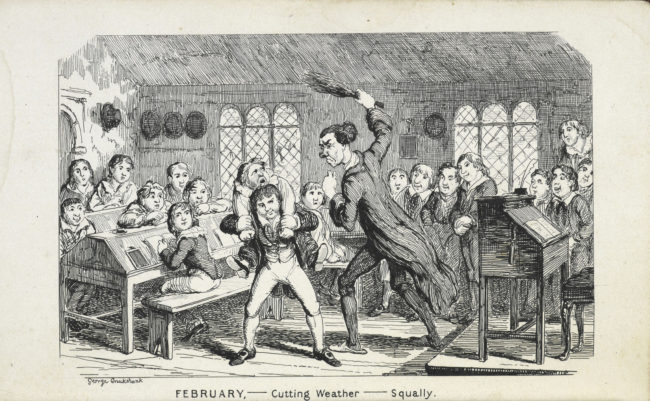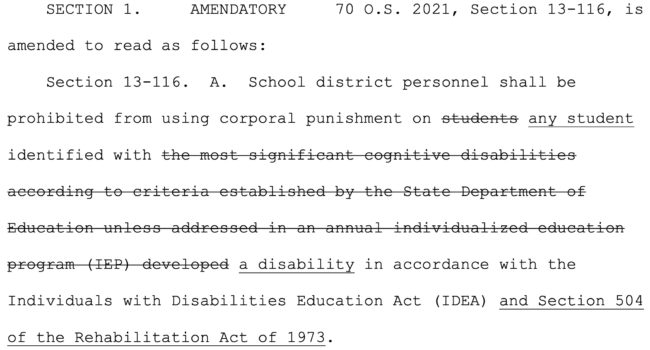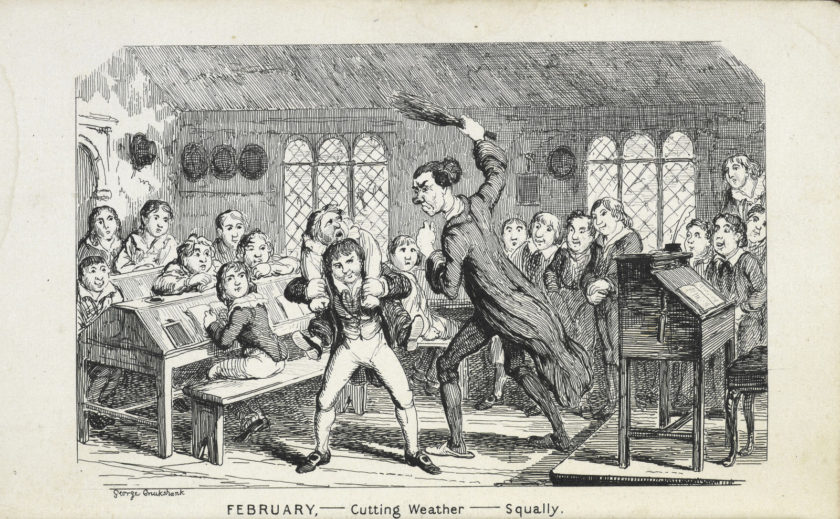
Currently it is legal for teachers in Oklahoma to punish students by physically beating them into submission. There is however a legal exception. Students who are defied as having “the most significant cognitive disabilities” are out of scope; teachers can’t legally beat them.
Republican State Rep. John Talley came up with a rather good idea, namely House Bill 1028. The purpose of this proposed amendment to the existing law looked like a slam dunk win – namely, modify the scope of the existing law to stop teachers physically assaulting any disabled students.
It was a very simple two page bill, of which the key to it was this bit …

Who could possibly have any objection to this, it really was a good step in the right direction.
Unfortunately, Mr Tully was not really up to speed with the religious beliefs of some of his fellow Republicans, or to be a tad more specific, State Rep. Jim Olsen.
Here is how it played out
Basically, Rep Olson cites a bible verse and then challenges his colleague by asking “how would you reconcile this bill with scriptures…?”
There is a bit more dialog, then a vote and that vote fails, so the amendment did not pass.
The Local Paper, Tulsa World, Nails it
If indeed you are going to use a religious text as your gold standard that everything has to precisely align with, then you are creating huge challenges.
Within an article titled “Oklahoma House fails bill protecting disabled kids from corporal punishment”, they make a rather good point. It explains his stance by quoting him …
“Somebody mentioned that American (Academy of) Pediatrics thinks (spanking) is a bad idea,” Rep. Jim Olsen, R-Roland, said after reading Bible verses he said prove that God condones corporal punishment. “I disagree. And I have a higher authority.”
… but then points out…
Olsen did not turn to Deuteronomy 21:18-21, which is usually translated as God ordering that “stubborn and rebellious” sons be stoned to death.
Indeed yes, beautifully played by the reporter there. Like most religious people do, Mr Olson simply cherry picks the bits he likes and interprets them to align with his currently prevailing beliefs. He claims he has a “divine authority” backing him up and that this trumps the prevailing scientific consensus which he dismisses
As is also noted by the article, a co-sponsor of the bill advises …
“I told (Talley) I would co-author this bill with him, that this would be an easy bill to carry because there’s going to be nobody who’s for corporal punishment on students with disabilities,” said Rep. Anthony Moore, R-Clinton. “Apparently I was wrong.
Yep, oh so very wrong indeed.
What exactly does the bible actually say?
The verse Mr Olson quotes is this …
“He who spares the rod hates his son, but he who loves him is careful to discipline him.” – Proverbs 13:24
So where exactly within those words does it state there that teachers should have the right to physically assault disabled kids?
Note that the verse is very specifically talking about dads and boys.
Clearly it says nothing about teachers and students.
Is that verse even a “divine” mandate for dads to physically assault their own boys?
Only if you interpret it that way.
A far better interpretation, one that makes a lot more sense, is to view the rod as a Shepard’s rod that is used to guide the sheep under his care in the right direction. When needed, he can also use the curved hook at the end to rescue any sheep that become ensnared and trapped. It’s not a stick to beat sheep into submission, but rather is a long thin rod to gently press against the side of the sheep and keep them going in the right direction.
But what about “Spare the rod and spoil the child”?
“Spare the rod and spoil the child” is not in the bible. The phrase comes from a 17th-century poem by Samuel Butler called Hudibras.
Your mind is about to be blown when you discover what the phrase actually references. In the poem the main adult characters are planning on starting a love affair. One of the characters asks the other to engage in sadomasochism and flagellation before she will go to bed with him. The actual quote is:
If matrimony and hanging go
By dest’ny, why not whipping too?
What med’cine else can cure the fits
Of lovers when they lose their wits?
Love is a boy, by poets styl’d
Then spare the rod, and spoil the child.
In other words, no sadomasochism, then no baby making is going to take place.
Yes really.
To answer Mr Olson, how exactly is his stance “biblical”, and why is his specific interpretation the supposed ultimate “divine authority” that trumps what the scientific evidence tells us about smacking?
What Does Science actually tell us about Smacking?
I’ve covered this once before (see here from Sep 2021), but for completeness, I’ll cover it here as well.
In June 2021, a very comprehensive peer-reviewed study was published within the world’s oldest and best-known general medical journal, The Lancet. It was a definitive landmark review that was led by an international team of experts. They analysed 20 years’ research on the topic and reached the following evidence-based conclusion:
Physically punishing children is not effective and increases behavioural problems
The full paper titled “ Physical punishment and child outcomes: a narrative review of prospective studies “ was published on June 28, 2021.
The summary reads as follows (the bold highlighting is mine):
Physical punishment is increasingly viewed as a form of violence that harms children.
This narrative review summarises the findings of 69 prospective longitudinal studies to inform practitioners and policy makers about physical punishment’s outcomes. Our review identified seven key themes.
First, physical punishment consistently predicts increases in child behaviour problems over time.
Second, physical punishment is not associated with positive outcomes over time.
Third, physical punishment increases the risk of involvement with child protective services.
Fourth, the only evidence of children eliciting physical punishment is for externalising behaviour.
Fifth, physical punishment predicts worsening behaviour over time in quasi-experimental studies.
Sixth, associations between physical punishment and detrimental child outcomes are robust across child and parent characteristics.
Finally, there is some evidence of a dose-response relationship.
The consistency of these findings indicates that physical punishment is harmful to children and that policy remedies are warranted.
You might of course hold a different opinion or a different belief.
The above however is neither, but rather rests upon solid robust data that demonstrates that if you smack your kids then you are not just harming them physically, you are also going to find more behaviour problems emerging. They will become worse, not better.
Additional comments by the Study Authors
The following quotes come Via University College London here. These are the subject matter experts, the folks who conducted this comprehensive study. You really should pay very close attention to their evidence-based conclusions …
“Physical punishment is ineffective and harmful and has no benefits for children and their families. This could not be clearer from the evidence we present.
“We see a definitive link between physical punishment and behavioural problems such as aggression and antisocial behaviour. Physical punishment consistently predicts increases in these types of behavioural difficulties. Even more worrying are findings that children who are the recipients of physical punishment are at increased risk of being subjected to more severe levels of violence.”
Lead author, Dr Anja Heilmann (UCL Department of Epidemiology and Public Health)
“Parents use physical punishment with their children because they think doing so will lead to better behaviour. But our research found clear and compelling evidence that physical punishment does not improve children’s behaviour and instead makes it worse.”
Senior author Elizabeth Gershoff, (Amy Johnson McLaughlin Centennial Professor in Human Development and Family Sciences at The University of Texas at Austin)
“As a former parliamentarian who championed the change in the law in Ireland and directly supported the legislative change in Scotland and Wales, I know the importance of ensuring an evidence base for policy and legislation.
“This review has documented compelling evidence that hitting children doesn’t work, and in many cases, it is harmful. A home should be a safe place for children, yet in many countries, the law can make it one of the most unsafe places for them. Countries need to do all they can to ensure that all children have equal protection from all forms of harm, including physical punishment.”
Jillian van Turnhout, co-author of the paper and a former Senator in the Irish Parliamen
“This is a public health issue. But physical punishment is not only harmful — it also violates children’s human rights. The United Nations Convention on the Rights of the Child is clear that children should have the same level of protection from all forms of violence that adults have. Countries where physical punishment is still legal must act and honour their obligations under the UNCRC by prohibiting physical punishment in all settings.
“In the UK this means that England and Northern Ireland should follow the example of Scotland and Wales and give children equal protection in law.”
Lead author, Dr Anja Heilmann (UCL Department of Epidemiology and Public Health)
If Teachers can’t assault students, then what should they do?
Schools do of course have rules, for example a dress code, behaviour, punctuality, work ethic, etc… Just as with everything else, if those standards are breached then there are consequences.
Today the use of Corporal punishment (to quote the wikipedia page on the topic) …
… has now disappeared from most Western countries, including all European countries. In the United States, corporal punishment is not used in public schools in 34 states, banned in 31, and permitted in 19, of which only 16 actually have school districts actively administering corporal punishment…
Why is its use fading away?
Because teachers do not just teach, they learn as well. One lesson that many have embraced is that there is no empirical evidence showing that corporal punishment leads to better control in the classrooms. If you want discipline, there are far better methods of behaviour management.
To be specific: Detention, Counseling, or Suspension.
If your tool of choice is to simply physically assault kids and beat them into submission, then you really should not be a teacher.
E pur si muove (And yet it moves)
When faced with religious clerics who forced Galileo to recant his supposed “heresy” that the Earth moves around the Sun, he is alleged to have said at one point “E pur si muove”. As far as the clerics were concerned the Earth was the centre of the universe because that was their interpretation of the bible. They had “divine authority”. Facts did not matter.
Galileo’s “crime” is that he was “making an evil use of physical science” to “vilify” the “Sacred Book”. We might now look back and laugh at such religious lunacy while also applauding Galileo for his insights that were based upon observations.
Yet here we are in 2023, replaying this grubby little saga. This time it is Mr Olsen playing the role of the Pope deploying “Divine Authority” to trample over reason, science, and common sense.
What can one say to him, and the many others supporting him, except of course “E pur si muove“
